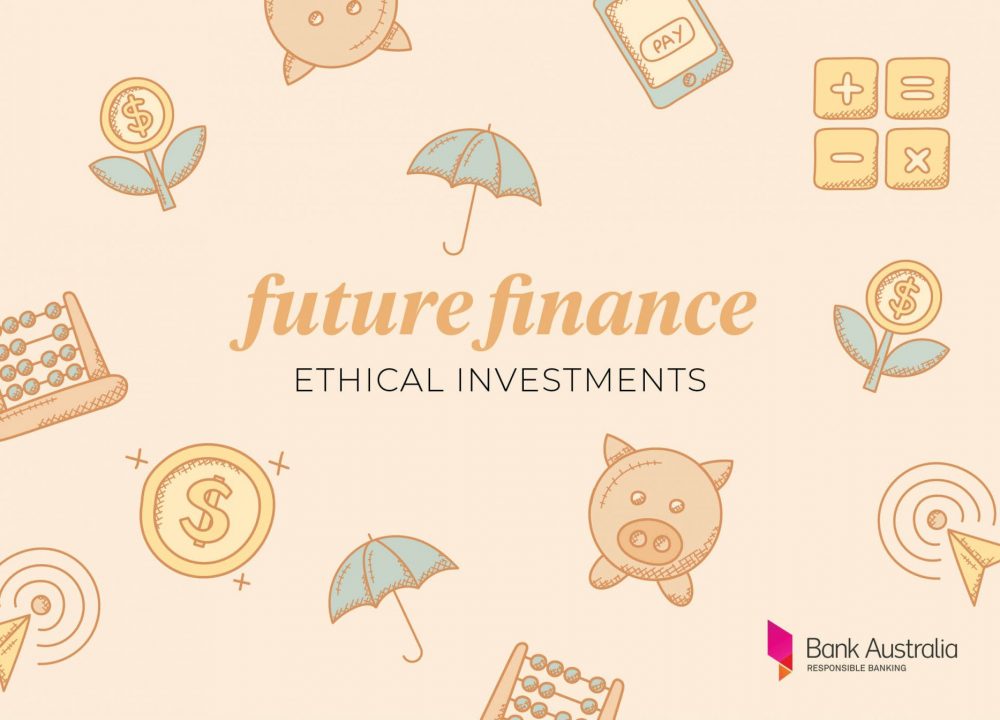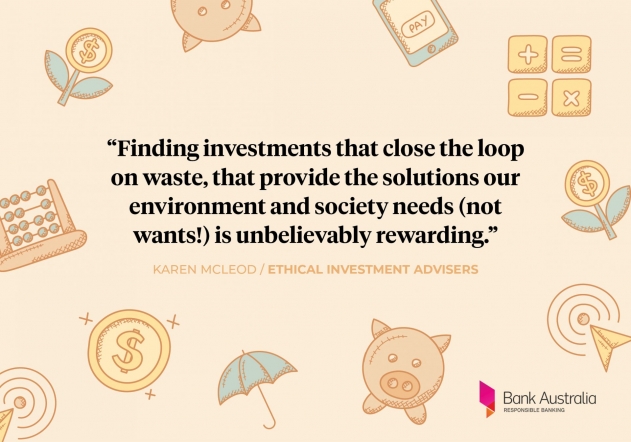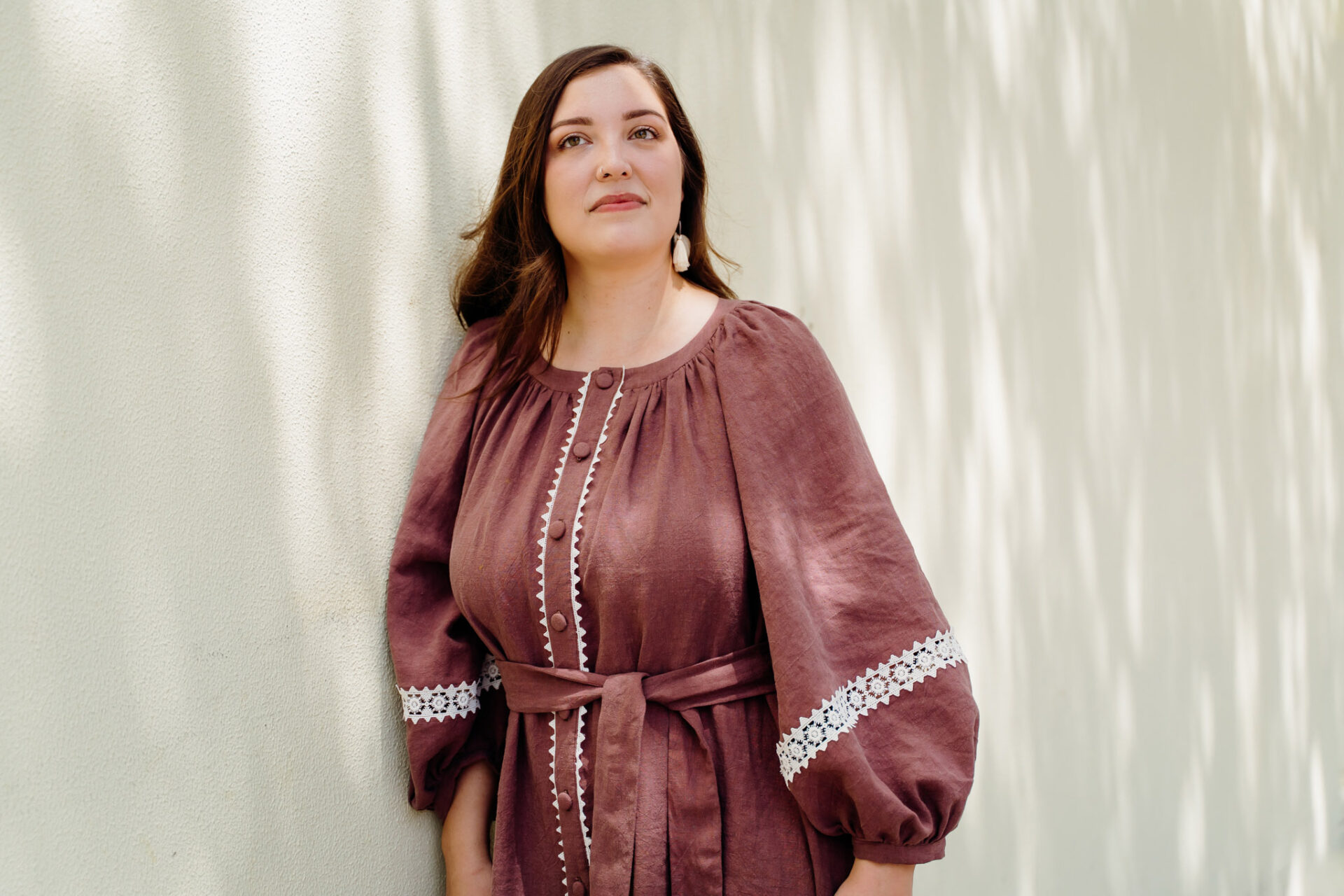Future Finance: What Are You Invested In?

- Words by Peppermint
When it comes to living a more ethical and sustainable life, sometimes you’ve gotta put your money where your mouth is — literally. But talk is cheap and finance fickle, so in this four-part online series on ethical money, created in collaboration with our friends at Bank Australia, we’ve balanced the books so you can live a more balanced life and use your money as a force for good. Next in the series: making sure your investments are ethical.
……….
Shares, stocks, futures and dividends – for most of us, investment banking lingo conjures dizzying images of a fast-paced trading room floor.
If there’s one aspect of the financial world that feels utterly off limits to everyday folk, it’s investment. But getting started with investing or ramping up your portfolio is easier than you might think. And you don’t have to go full Wolf of Wall Street to start seeing results.
As with everything financial, the investments landscape is fraught with ethical landmines. One of the most important things to consider when deciding on a fund, advisor or company is the triple bottom line: investments that create a positive environmental and social impact as well as healthy financial returns.
What is investing anyway?
In the simplest sense, investing involves putting your money into an asset with the aim of generating a profit. Those profits are known as capital gains.
There are four broad classes of investment assets: stocks, bonds, commodities (such as gold and silver), and real estate. In terms of ethics, it’s the first two that can be particularly problematic.
When you purchase stocks, you buy into the company – and, by extension, its activities, code of conduct, business practices and ethos.
When a publicly traded company floats shares on the stock market or an organisation issues bonds, it’s essentially inviting you to buy a stake in its future. When you purchase stocks, you buy into the company – and, by extension, its activities, code of conduct, business practices and ethos – even if only temporarily. You profit off its successes and feel its losses.
What kind of companies are you prepared to invest in?
In the financial world, the concept of ‘sin stocks’ describes publicly traded companies associated with unethical or harmful industries. Prominent examples include the manufacture of nuclear weapons or industries linked to human trafficking. They may be profitable, but for many investors, the human and environmental cost is too much to bear.
Ethical investing, by contrast, describes the pursuit of investments that are net positive. It’s by no means a new concept – some of the earliest examples come from religious groups in the United States that prohibited their members from investing in the slave trade.
Today though, ethical investing is most often associated with social and environmental issues, particularly abstaining from fossil fuels like coal. The name ‘green bonds’ is used to describe investments that operate along that triple bottom line.
What does ‘ethical’ even mean in the investment world?
Coal mines versus hydropower is an obvious example, but not everything is so cut and dry. As ethical investing has surged in popularity, the market has become murkier and more saturated, making it difficult to navigate.
Ethical investors have criteria to help evaluate companies and industries though. Known as ESG (environmental, social and governance) factors, in practice they provide an alternative lens to examine an investment beyond the potential return, looking at how a company turns its profit. An ethical portfolio is built by rejecting companies that don’t align (exclusionary screening) and then targeting competitors with better ESGs.
The difficulty is that ESG factors are, to some degree, subjective. Every financial advisor and firm has a different tolerance for what’s ethical and what’s not. “For the most part, it means ‘do no harm’ or ‘avoid harm’, and more importantly, invest in doing more ‘good’,” explains Karen McLeod. A certified financial planner and member of Ethical Investment Advisers, Karen also sits on the board of the Responsible Investment Association Australasia (RIAA), a network of over 300 members who champion responsible investing in our region.
“It’s different for each person,” she continues, “but we do see some consistent themes: from renewable energy and clean technologies, recycling and closing the loop on waste, healthcare, education, all the way to microfinance loans and social infrastructure like bikeways.” By looking at ESGs, industries that are wasteful, polluting or non-renewable can be eliminated.

How can we set the bar higher?
The world is changing and transitioning to renewables, but many investments are yet to catch up. This has created a new phenomenon, something Carbon Tracker calls ‘stranded assets’ – investments that will stop earning a return long before their anticipated life cycle ends. In other words, assets that are at risk of being worth far less than was projected because the world has changed.
Action around climate change and global warming, particularly the signing of the Paris Accord, devalues fossil fuels and non-renewables. Gas reserves that may never see the light of day, pipelines that may never be completed, rigs and tankers that may never be used – these are all examples of stranded assets.
As we teeter on the brink of meaningful climate action, there’s never been a better time to drop potential stranded assets and invest in future-proof green bonds. Divesting from fossil fuels and casting a vote of confidence in companies working to improve the health of our planet is catching on. The RIAA’s 2020 Benchmark Report shows that of the consumers who used their online tool to screen funds, 36% wanted to exclude fossil fuel investments from the mix.
Recent research comparing more than 5,000 investment funds found that sustainable funds matched or outperformed traditional funds across a range of categories.
Ethical investing doesn’t mean having to compromise on returns, either. Quite the opposite in fact. Recent research comparing more than 5,000 investment funds found that sustainable funds matched or outperformed traditional funds across a range of categories. In hard numbers, the average annual return for an ethical fund invested in global companies was measured at 6.9% a year, while a traditionally invested fund came in at 6.3% a year.
Figures for 2020 are expected to be even more pronounced: investments in clean tech stock have soared during the pandemic while oil, gas and coal have plummeted.
Here in Australia, ethical investments now account for almost $1 trillion of professionally managed assets, according to data from RIAA. Ethical investors control 44% of all managed assets – a share that continues to grow year on year.
As Karen points out, ethical investing is booming because its appeal goes far beyond financial results. “Finding investments that close the loop on waste, that provide the solutions our environment and society needs (not wants!) is unbelievably rewarding,” she says. “Making a good return while knowing your money is having a positive impact gives you a great sense of satisfaction and peace of mind.”
Where do I start?
Draw your line – Ethics are subjective, so start with a firm idea of what companies/industries you would and wouldn’t feel comfortable investing in. The UN Principles for Responsible Investment and Dow Jones Sustainability World Index are a good place to start.
Calculate your (potential) impact – Still on the fence about ethical investing? Use an online impact calculator to see how your money could make a difference.
Know exactly where you’re investing – If you’re buying into a mutual fund or EFT, make sure they are transparent about all investment partners, “not just the top ten,” Karen says. “Ethical funds know this is important and in fact it’s law in basically every market except for Australia.”
Beware of greenwashing – Many investments claim to be ‘green’, ‘ethical’ or ‘socially responsible’, but often this is little more than a marketing ploy. “Greenwashing is rife as a tsunami of products are being launched,” Karen warns. “Make sure you read the fine print about the thresholds. Often a fund manager will still include a company in a portfolio if they have less than five percent of their revenue in a screened-out sector.”
Seek professional advice – If you’re new to investing, you might want to engage a financial advisor. Try using RIAA’s member directory of people and organisations engaged in responsible, ethical and impact investing across Australia and New Zealand.
READ MORE FROM OUR FUTURE FINANCE SERIES
General advice warning: This information is general and does not take into account your objectives, financial situation or needs. You should consider whether the advice is suitable for you and your personal circumstances. Before you make any decision about whether to acquire a certain product, you should obtain and read the relevant product disclosure statement.
Our Future Finance Series has been created in partnership with our friends at Bank Australia. Want to align your money with your values? Head to their website to find out how you can use your money for good.
words EMILY LUSH
JOIN OUR MAILING LIST
Brighten up your inbox with our not-too-frequent emails featuring Peppermint-related news, events, competitions and more!
explore
More articles
Look, I don’t want to make anyone panic but IT’S DECEMBER!!! If you’re planning to give homemade gifts, you’re going to have to act fast. …
Hang out with us on Instagram
🌻 The Paddington 🌻
This is a much-loved staple, created for Issue 50 in 2021. We love seeing the #PeppermintPaddingtonTop continually popping up in our feeds!
How stunning is our model Elon MelaninGoddessEfon – she told us it was one of the first times she had been asked to come to a shoot with her natural hair. 🌻
We worked with South African patternmaker Sarah Steenkamp of @FrenchNavyNow_ to create this wardrobe essential – the perfect puff-sleeve blouse. Raglan sleeves make it the ultimate beginner sew, plus the gorgeous back buttons let you add your own personal twist.
Pattern via the link in bio! 🪡
Photos: @KelleySheenan
Fabric: @Spoonflower
Model: MelaninGoddessEfon

“In the 1940’s, Norwegians made and wore red pointed hats with a tassel as a form of visual protest against Nazi occupation of their country. Within two years, the Nazis made these protest hats illegal and punishable by law to wear, make, or distribute. As purveyors of traditional craft, we felt it appropriate to revisit this design.”
Crafters have often been at the heart of many protest movements, often serving as a powerful means of political expression. @NeedleAndSkein, a yarn store in Minnesota, are helping to mobilise the craftivists of the world with a ‘Melt The Ice’ knitting pattern created by @Yarn_Cult (with a crochet pattern too), as a way of peaceful protest.
The proceeds from the $5 pattern will go to local immigrant aid organisations – or you can donate without buying the pattern.
Raise those needles, folks – art and craft can change the world. 🧶
Link in bio for the pattern.
Images: @Gather_Fiber @NeedleAndSkein @a2ina2 @KyraGiggles Sandi.204 @WhatTracyMakes AllieKnitsAway Auntabwi2
#MeltTheIce #Craftivism #Knitting #CraftForChange

TWO WEEKS TO GO! 🤩
"The most important shift is moving from volume-led buying to value-led curation – choosing fewer, better products with strong ethics, considered production and meaningful stories. Retailers have real influence here: what you buy signals what you stand for. At Life Instyle, this means using the event to discover and invest in small-scale, planet-considerate brands that align with your values and your customer’s conscience. Consumers don’t need more things; they need better things, and retailers play a key role in selecting, contextualising, and championing why those products matter."
Only two more weeks until @Life_Instyle – Australia`s leading boutique retail trade show. If you own a store, don`t miss this event! Connect with designers, source exquisite – and mindful – products, and see firsthand why this is Australia’s go-to trade show for creatives and retailers alike. And it`s free! ✨️
Life Instyle – Sydney/Eora Country
14-17 February 2026
ICC, Darling Harbour
Photos: @Samsette
#LifeInstyle #SustainableShopping #SustainableShop #RetailTradeEvent

Calling all sewists! 📞
Have you made the Peppermint Waratah Wrap Dress yet? Call *1800 I NEED THIS NOW to get making!
This gorgeous green number was modelled (and made) by the fabulous Lisa of @Tricky.Pockets 🙌🏼
If you need a nudge, @ePrintOnline are offering Peppermint sewists a huge 🌟 30% off ALL A0 printing 🌟 when you purchase the Special Release Waratah Wrap Dress pattern – how generous is that?!
Head to the link in bio now 📞
*Not a real number in case that wasn`t clear 😂
#PeppermintWaratahWrapDress #PeppermintPatterns #SewingPattern #WrapDress #WrapDressPattern

8 Things to Know About January 26 - from @ClothingTheGaps:
Before you celebrate, take the time to learn the truth. January 26 is not a day of unity it’s a Day of Mourning and Survival for Aboriginal and Torres Strait Islander peoples.
It marks the beginning of invasion, dispossession, and ongoing colonial violence. It’s time for truth-telling, not whitewashed history.
Stand in solidarity. Learn. Reflect. Act.
✊🏽 Blog written by Yorta Yorta woman Taneshia Atkinson.
🔗 Link in bio of @ClothingTheGaps to read the full blog
#ChangeTheDate #InvasionDay #SurvivalDay #AlwaysWasAlwaysWillBe #ClothingTheGaps

As the world careens towards AI seeping into our feeds, finds and even friend-zones, it`s becoming increasingly hard to ignore.
We just wanted to say that here at Peppermint, we are choosing to not print or publish AI-generated art, photos, words, videos or content.
Merriam-Webster’s human editors chose `slop` as the 2025 Word of the Year – they define it as “digital content of low quality that is produced usually in quantity by means of artificial intelligence.” The problem is, as AI increases in quality, it`s becoming more and more difficult to ascertain what`s real and what`s not.
Let`s be clear here, AI absolutely has its place in science, in climate modelling, in medical breakthroughs, in many places... but not in replacing the work of artists, writers and creatives.
Can we guarantee that everything we publish is AI-free? Honestly, not really. We know we are not using it to create content, but we are also relying on the artists, makers and contributors we work with, as well as our advertisers, to supply imagery, artwork or words created by humans. AI features are also creeping into programs and apps too, making it difficult to navigate. But we will do our best to avoid it and make a stand for the artists and creatives who have had their work stolen and used to train AI machines, and those who are now losing work as they are replaced by this energy-sapping, environment-destroying magic wand.
Could using it help our productivity and bottom line? Sure. And as a small business in a difficult landscape, that`s a hard one to turn down. We know other publishers who use AI to write stories, create recipes, produce photo shoots... but this one is important to us.
`Touch grass` was also a Merriam-Webster Word of the Year. We`ll happily stick with that as a theme, thanks very much. 🌿

















